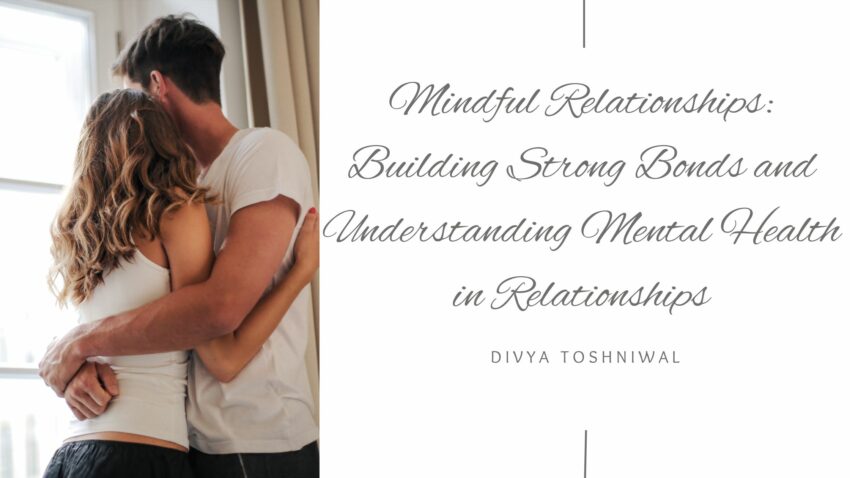Maintaining relationships is not an easy task. It is about adjusting to a new person, understanding and delicately balancing both your needs. With so much going on in your own personal life, adding the aspect of a relationship can be very taxing, but everyone needs a companion and hence we crave that togetherness. The problem arises when this relationship becomes a burden instead of a support. There are a variety of reasons why this may happen but let us talk about solutions and not problems. The solution is simple and that is maintaining mindful relationships.
Maintaining mindful relationships can be affected your mental health and having mindful relationships can turn around your mental health for the better too. Nobody is perfect, but two imperfect people can also make a perfect relationship that works for them.
Table of Contents
What are Mindful Relationships?
Most of us today are not paying too much attention to our relationships these days. We do a lot of stuff to get into a relationship with someone we like and then once we are comfortable with each other we start taking each other for granted. We spend more time on our phones than with our partners and this creates relationship loneliness. There are people in this world who don’t have someone to share their life with, but I believe the worst is the case for those who do have someone and still are lonely. It is extremely important for us to realize this loneliness and turn it around by being more mindful in our relationships.
Mindful relationships are relationships where individuals practice mindfulness and consciously be aware of their interactions and communication with one another. This type of relationship is characterized by open and honest communication, empathy, non-judgment, and a focus on personal growth and self-improvement. The goal is to cultivate a deeper connection, understanding, and appreciation for one another.

Effect of Bad Mental Health on Relationships
When you are in a relationship, your personal mental health will matter a lot. If you carry the baggage of emotional setbacks and mental health issues it is bound to affect your relationships too. Bad mental health can have a significant impact on relationships in several ways:
- Communication issues: Mental health struggles can make it difficult for individuals to express themselves, leading to misunderstandings and conflict. People may also be hesitant to express themselves or too arrogant and loud in their expressions due to previous bad experiences. These little misunderstandings and communication gaps can create a big rift between the partners.
- Intimacy issues: These can be both physical and mental. When someone goes through mental health issues it may become tougher for them to be physically intimate in their relationships. But it is not restricted to only physical intimacy, any form of intimacy where they feel vulnerable may become tough for them.
- Stress and Burnout: Troubled mental health in one person can create stress and burnout in both partners when in a relationship. This puts an additional strain on the relationship, which itself is going through its own phase of adjustments. Your stress can create an unpleasant atmosphere where it can become the cause of killing the positivity and joy in your relationship and may put off your partner too. [ Also read: The unrecognized signs of stress and how to effectively deal with stress and burnout]
- Emotional outbursts: Mental health problems can lead to mood swings, irritability, and outbursts, making it challenging to manage emotions in a healthy and productive way. When you have unregulated emotions even the littlest of things can tip you. This makes it extremely tough for your partner to navigate through. It is like always walking on eggshells and never knowing how you would react.
- Toxicity: A toxic relationship is where you are suffering from dynamics and behaviors that are physically, mentally, or emotionally taxing. One of the things that majorly lead to a toxic relationship is the mental health conditions of one/both partners. [Also read how to deal with toxic relations]
- Insensitivity: Your mental health issues can make you insensitive towards your partner’s feelings and vice versa.
In a mindful relationship, partners prioritize their mental and emotional well-being and make an effort to stay present in the moment. They listen actively, communicate openly, and seek to understand each other’s perspectives and emotions. They also work to recognize and manage their own thoughts, feelings, and reactions and avoid reactivity.
Practicing mindfulness in relationships can lead to greater empathy, compassion, and intimacy. It can also help to reduce conflicts, increase resilience, and promote personal growth for both partners.
However, it requires effort and commitment from both partners and requires continuous self-reflection and communication. Maintaining a mindful relationship requires regular intentional practices and a commitment to personal growth and development.

How To Maintain Mindful Relationships
It’s important to seek professional help if mental health struggles are affecting a relationship. With the right support, individuals can learn to manage their mental health, improve communication, and strengthen their relationships. But here are a few practices that can help you cultivate a mindful relationship.
Practice Self Awareness
To know and understand your partner, you need to understand yourself first. If you do not know where you stand you cannot create a path to where you want to go. Hence self-awareness is the first step in any journey you want to take. Understand your value systems, temperament, your personality, your interests, your strengths, and weaknesses before you try to analyze the other person. [Also read: Vitals of self-awareness]
Open Communication
While getting into a relationship, the worst mistake we do is creating a fake impression. After a few days when we cannot carry the burden of the fake personality we were carrying, the relationship collapses. Hence, it is very important to be true to yourself and to your partner from the beginning of a relationship. Encourage open, honest, and non-judgmental communication with your partner.
Listen Actively
Most of us listen with a purpose and sadly the purpose is to give back a reply. This is where miscommunication starts when you do not listen to understand what the other person is saying but give them a reply. Practice active listening, showing empathy and understanding of your partner’s perspective.
Stay Present
One of the biggest issues that are faced by most people in a relationship is that their partners spend more time on their phones than with them. Every individual has so many distractions that the ability to just be there in the moment is almost disappearing. Make an effort to stay present at the moment, instead of getting lost in thoughts or distractions.
Regulate Your Emotions
Your unmanaged emotions can be a big issue not only for you but also for your partner. Learn to regulate your emotions in a healthy way and avoid reactivity. Try to build emotional resilience. Understand more about emotional intelligence and how you can use the power of your emotions.
Practice Gratitude
The need to always have more is what is killing relationships these days. We focus more on what our partners did not do for us than whatever they have done for us. If they have a good sense of humor, we complain they are not caring enough, if they are caring we say they are possessive, if they give us freedom and space then we complain they don’t spend enough time with us, and so on. Nothing ever is enough. We have forgotten to appreciate what they do for us. Express appreciation and gratitude for your partner and the relationship. It will change your relationship to a great extent.
Foster empathy
Empathy is a very crucial tool to cultivate mindful relationships. The ability to understand something from your partner’s point of view will help you see the larger picture and avoid any kinds of miscommunications and misunderstandings. Seek to understand and empathize with your partner’s feelings, experiences, and perspectives.
Be Kind and Give Compliments
A few words of kindness on a hectic and stressful day can bring a smile to your partner’s face. If they have had a tough day take the burden off their shoulders, help them relax, treat them with something they love, or maybe give them some ‘me time’. Tell them you are proud of them. Tell them they deserve this break. Show kindness and compassion to your partner, even in challenging times.
Set Boundaries
Clearly define and communicate your needs and boundaries in the relationship. Both you and your partner should be aware of your respective boundaries. Both of you should respect each other’s individuality and identity in this relationship.
Invest in Self-Growth
A very crucial aspect of mindful relationships is that you do not forget yourself and your personal growth. Personal stagnation can also lead to stagnation in your relationships which may lead to feelings of being stuck. Cultivate personal growth and self-improvement to enhance your relationship and bring more positivity to it.
Benefits of Mindful Relationships on Your Mental Health
There are a number of improvements that you will notice in your mental health when you start practicing mindfulness in your relationships. Here are a few that may motivate you to do so.
Reduced Stress and Anxiety
When you are in a mindful relationship, your partner becomes your companion and not a competitor. You do not have to fight with them to make them understand your stressors and anxiety. They would know your needs and respect your boundaries. They will make your life easier, hence, reducing overall stress and anxiety in your life and improving your mental health.
Increased Feelings of Security
Mindful relationships lead to a sense of security in relationships. It assures you that you have a safe space to talk. A place where you will not be judged and where you can open your heart in front of your partner without the fear of what they would think.
Improved Connectedness
In a world that is full of profit and loss-based relationships, you have someone whom you can rely on for good and honest opinions and suggestions. Someone is there to love you and guide you without being biased. When you are attentive toward each other and listen to each other you can connect to each other smoothly.
Decreased Loneliness and Depression
Mindful relationships can provide a source of support and reduce feelings of loneliness and depression. Having a space that is safe and non-judgmental helps you process your emotions well. Having someone to listen to you and empathize with you reduces feelings of loneliness. But most importantly compassion, compliments, kindness, and appreciation are what help you deal with the feelings of depression and loneliness that a lot of us suffer from today.
Increased Resilience and Emotional Regulation
Mindful relationships help you to manage your own emotions and build better emotional resilience. Your partner acts as a support towards your personal emotional growth. They help you develop greater resilience and coping skills in managing difficult emotions, promoting overall well-being.
Increased Self-confidence
Hearing the words of kindness and appreciation gives your self-confidence a boost. Even when the world is against you, there is a feeling of support from your partner and sometimes that is more than enough to keep going and achieving your goals.
Personal Growth
In a mindful relationship, your partner makes sure that you are not held back. They will support your growth and work for it along with you. They will inspire you to grow and achieve goals that you could not even imagine for yourself. Since they show unconditional confidence in you and you can trust them for putting on the table their honest opinions and suggestions, it helps you a lot in your personal journey of growth.
Remember, mindfulness in relationships takes effort and commitment, and it’s a continuous process of self-reflection, growth, and communication.
P.S. It’s important to seek professional help if mental health struggles are affecting a relationship. With the right support, individuals can learn to manage their mental health, improve communication, and strengthen their relationships. To build stronger connections and cultivate mindful relationships you can also connect to a relationship coach to help you navigate through this wonderful journey.
